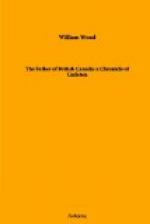Next to Wolfe himself Carleton was the busiest man in the army throughout the siege of Quebec. In addition to his arduous and very responsible duties as quartermaster-general, he acted as inspector of engineers and as a special-service officer for work of an exceptionally confidential nature. As quartermaster-general he superintended the supply and transport branches. Considering that the army was operating in a devastated hostile country, a thousand miles away from its bases at Halifax and Louisbourg, and that the interaction of the different services—naval and military, Imperial and Colonial—required adjustment to a nicety at every turn, it was wonderful that so much was done so well with means which were far from being adequate. War prices of course ruled in the British camp. But they compared very favourably with the famine prices in Quebec, where most ‘luxuries’ soon became unobtainable at any price. There were no canteen or camp-follower scandals under Carleton. Then, as now, every soldier had a regulation ration of food and a regulation allowance for his service kit. But ‘extras’ were always acceptable. The price-list of these ‘extras’ reads strangely to modern ears. But, under the circumstances, it was not exorbitant, and it was slightly tempered by being reckoned in Halifax currency of four dollars to the pound instead of five. The British Tommy Atkins of that and many a later day thought Canada a wonderful country for making money go a long way when he could buy a pot of beer for twopence and get back thirteen pence Halifax currency as change for his English shilling. Beef and ham ran from ninepence to a shilling a pound. Mutton was a little dearer. Salt butter was eightpence to one-and-threepence. Cheese was tenpence; potatoes from five to ten shillings a bushel. ’A reasonable loaf of good soft Bread’ cost sixpence. Soap was a shilling a pound. Tea was prohibitive for all but the officers. ‘Plain Green Tea and very Badd’ was fifteen shillings, ‘Couchon’ twenty shillings, ‘Hyson’ thirty. Leaf tobacco was tenpence a pound, roll one-and-tenpence, snuff two-and-threepence. Sugar was a shilling to eighteen pence. Lemons were sixpence apiece. The non-intoxicating ‘Bad Sproos Beer’ was only twopence a quart and helped to keep off scurvy. Real beer, like wine and spirits, was more expensive. ‘Bristol Beer’ was eighteen shillings a dozen, ‘Bad malt Drink from Hellifax’ ninepence a quart. Rum and claret were eight shillings a gallon each, port and Madeira ten and twelve respectively. The term ‘Bad’ did not then mean noxious, but only inferior. It stood against every low-grade article in the price-list. No goods were over-classified while Carleton was quartermaster-general.




